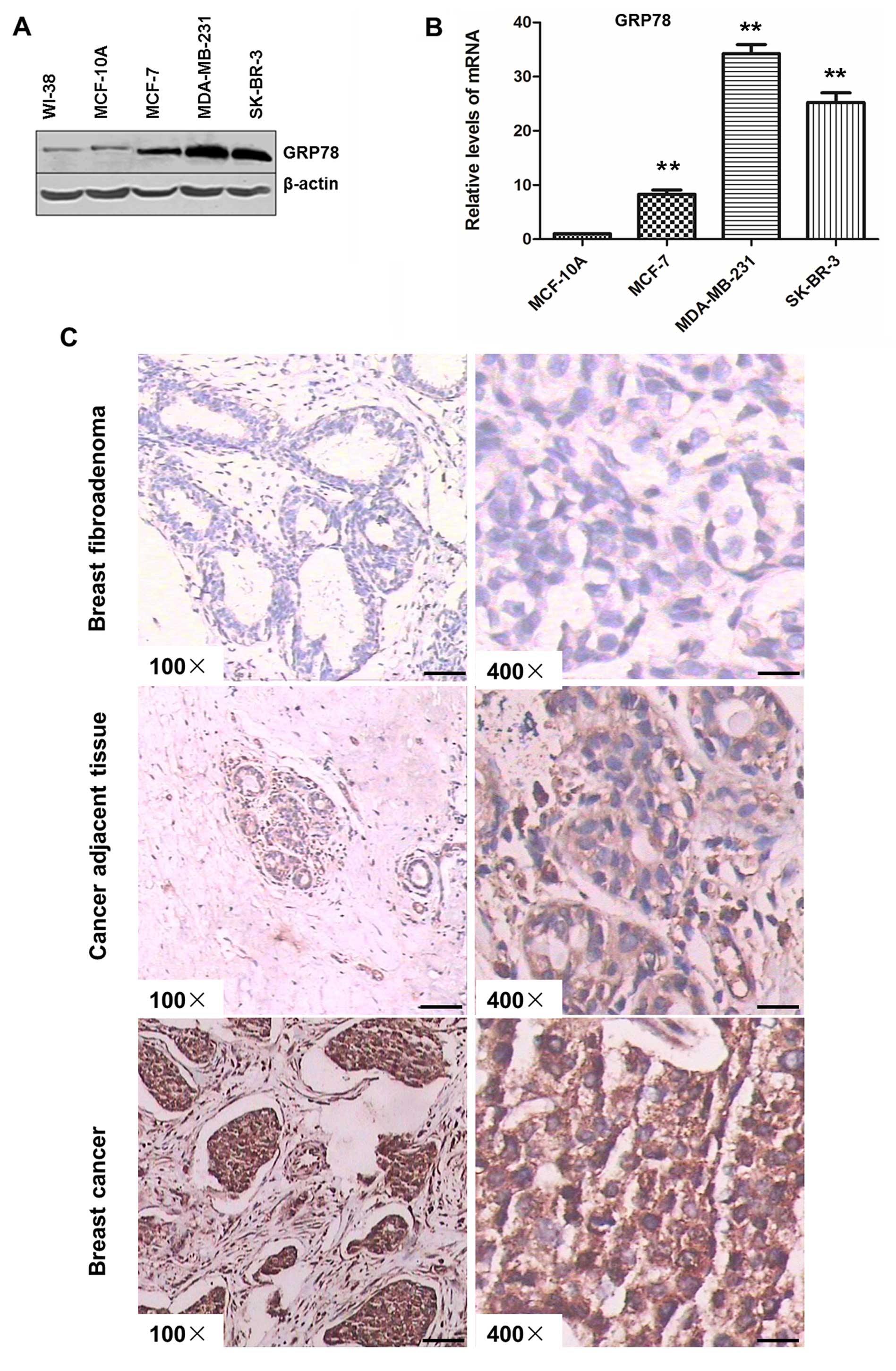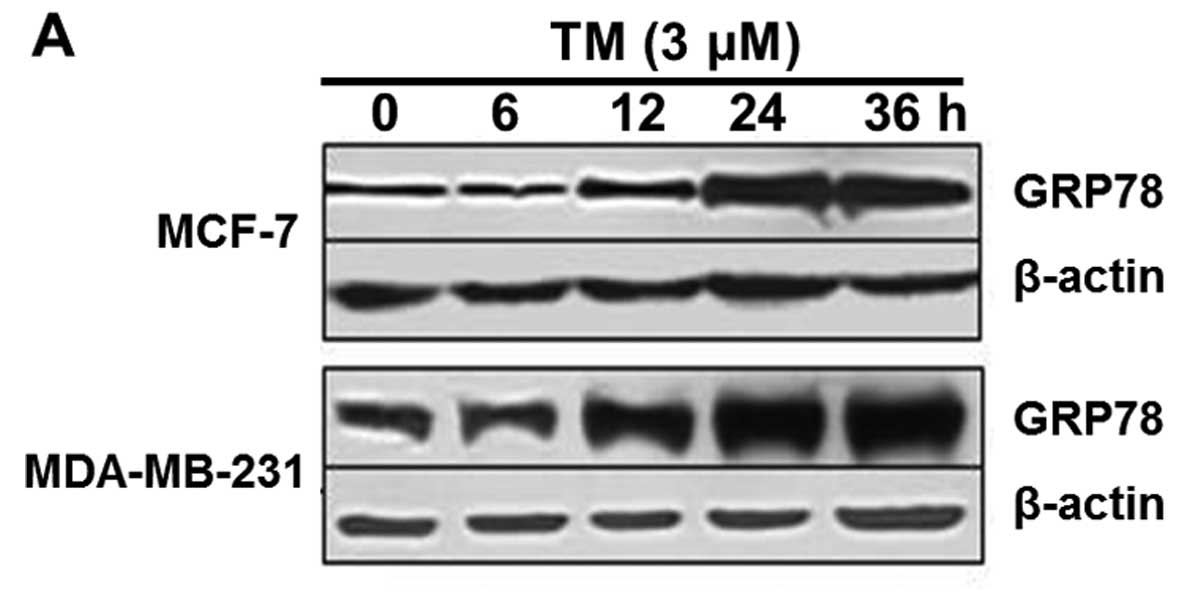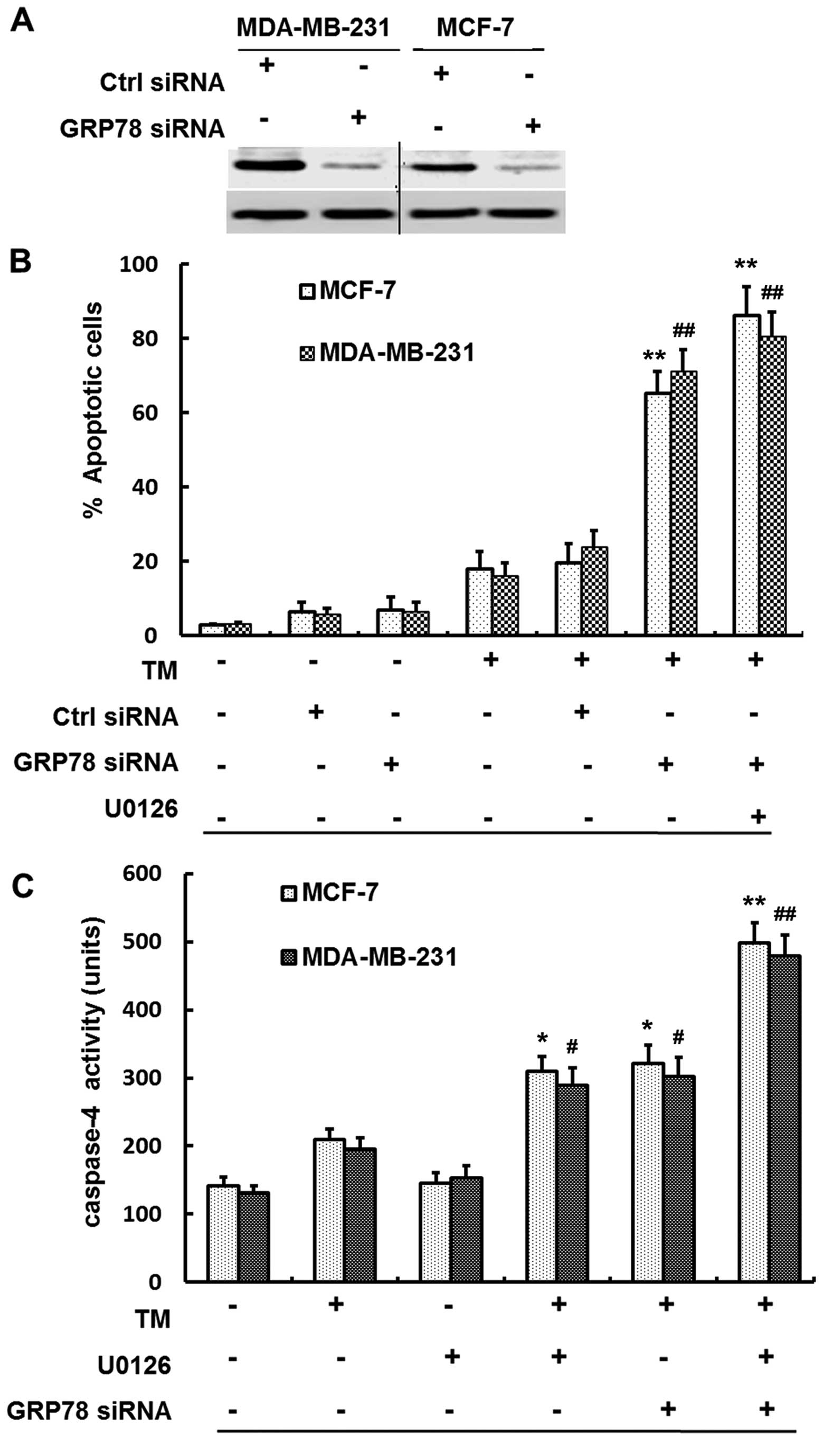|
1
|
Pluquet O, Pourtier A and Abbadie C: The
unfolded protein response and cellular senescence. A review in the
theme: Cellular mechanisms of endoplasmic reticulum stress
signaling in health and disease. Am J Physiol Cell Physiol.
308:C415–C425. 2015. View Article : Google Scholar
|
|
2
|
Manié SN, Lebeau J and Chevet E: Cellular
mechanisms of endoplasmic reticulum stress signaling in health and
disease. 3 Orchestrating the unfolded protein response in
oncogenesis: An update. Am J Physiol Cell Physiol. 307:C901–C907.
2014. View Article : Google Scholar
|
|
3
|
Bian Q, Fernandes AF, Taylor A, Wu M,
Pereira P and Shang F: Expression of K6W-ubiquitin in lens
epithelial cells leads to upregulation of a broad spectrum of
molecular chaperones. Mol Vis. 14:403–412. 2008.PubMed/NCBI
|
|
4
|
Shoulders MD, Ryno LM, Genereux JC,
Moresco JJ, Tu PG, Wu C, Yates JR III, Su AI, Kelly JW and Wiseman
RL: Stress-independent activation of XBP1s and/or ATF6 reveals
three functionally diverse ER proteostasis environments. Cell Rep.
3:1279–1292. 2013. View Article : Google Scholar : PubMed/NCBI
|
|
5
|
Ni M, Lee AS and Ni MandLee AS: ER
chaperones in mammalian development and human diseases. FEBS Lett.
581:3641–3651. 2007. View Article : Google Scholar : PubMed/NCBI
|
|
6
|
Jaronen M, Goldsteins G and Koistinaho J:
ER stress and unfolded protein response in amyotrophic lateral
sclerosis-a controversial role of protein disulphide isomerase.
Front Cell Neurosci. 8:4022014. View Article : Google Scholar : PubMed/NCBI
|
|
7
|
Rainbolt TK, Saunders JM and Wiseman RL:
Stress-responsive regulation of mitochondria through the ER
unfolded protein response. Trends Endocrinol Metab. 25:528–537.
2014. View Article : Google Scholar : PubMed/NCBI
|
|
8
|
Wang M, Wey S, Zhang Y, Ye R and Lee AS:
Role of the unfolded protein response regulator GRP78/BiP in
development, cancer, and neurological disorders. Antioxid Redox
Signal. 11:2307–2316. 2009. View Article : Google Scholar : PubMed/NCBI
|
|
9
|
Matsuo K, Gray MJ, Yang DY, Srivastava SA,
Tripathi PB, Sonoda LA, Yoo EJ, Dubeau L, Lee AS and Lin YG: The
endoplasmic reticulum stress marker, glucose-regulated protein-78
(GRP78) in visceral adipocytes predicts endometrial cancer
progression and patient survival. Gynecol Oncol. 128:552–559. 2013.
View Article : Google Scholar
|
|
10
|
Schröder M and Kaufman RJ: ER stress and
the unfolded protein response. Mutat Res. 569:29–63. 2005.
View Article : Google Scholar
|
|
11
|
Wang C, Jiang K, Gao D, Kang X, Sun C,
Zhang Q, Li Y, Sun L, Zhang S, Guo K, et al: Clusterin protects
hepatocellular carcinoma cells from endoplasmic reticulum stress
induced apoptosis through GRP78. PLoS One. 8:e559812013. View Article : Google Scholar : PubMed/NCBI
|
|
12
|
Pootrakul L, Datar RH, Shi SR, Cai J,
Hawes D, Groshen SG, Lee AS and Cote RJ: Expression of stress
response protein Grp78 is associated with the development of
castration-resistant prostate cancer. Clin Cancer Res.
12:5987–5993. 2006. View Article : Google Scholar : PubMed/NCBI
|
|
13
|
Mhaidat NM, Wang Y, Kiejda KA, Zhang XD
and Hersey P: Docetaxel-induced apoptosis in melanoma cells is
dependent on activation of caspase-2. Mol Cancer Ther. 6:752–761.
2007. View Article : Google Scholar : PubMed/NCBI
|
|
14
|
Choudhury S, Bhootada Y, Gorbatyuk O and
Gorbatyuk M: Caspase-7 ablation modulates UPR, reprograms TRAF2-JNK
apoptosis and protects T17M rhodopsin mice from severe retinal
degeneration. Cell Death Dis. 4:e5282013. View Article : Google Scholar : PubMed/NCBI
|
|
15
|
Estornes Y, Aguileta MA, Dubuisson C, De
Keyser J, Goossens V, Kersse K, Samali A, Vandenabeele P and
Bertrand MJ: RIPK1 promotes death receptor-independent
caspase-8-mediated apoptosis under unresolved ER stress conditions.
Cell Death Dis. 6:e17982015. View Article : Google Scholar : PubMed/NCBI
|
|
16
|
Banerjee C, Singh A, Das TK, Raman R,
Shrivastava A and Mazumder S: Ameliorating ER-stress attenuates
Aeromonas hydrophila-induced mitochondrial dysfunctioning and
caspase mediated HKM apoptosis in Clarias batrachus. Sci Rep.
4:58202014. View Article : Google Scholar : PubMed/NCBI
|
|
17
|
Sandow JJ, Dorstyn L, O'Reilly LA, Tailler
M, Kumar S, Strasser A and Ekert PG: ER stress does not cause
upregulation and activation of caspase-2 to initiate apoptosis.
Cell Death Differ. 21:475–480. 2014. View Article : Google Scholar :
|
|
18
|
Binet F, Chiasson S and Girard D: Evidence
that endoplasmic reticulum (ER) stress and caspase-4 activation
occur in human neutrophils. Biochem Biophys Res Commun. 391:18–23.
2010. View Article : Google Scholar
|
|
19
|
Matsuzaki S, Hiratsuka T, Kuwahara R,
Katayama T and Tohyama M: Caspase-4 is partially cleaved by calpain
via the impairment of Ca2+ homeostasis under the ER
stress. Neurochem Int. 56:352–356. 2010. View Article : Google Scholar
|
|
20
|
Adachi T, Teramachi M, Yasuda H, Kamiya T
and Hara H: Contribution of p38 MAPK, NF-κB and glucocorticoid
signaling pathways to ER stress-induced increase in retinal
endothelial permeability. Arch Biochem Biophys. 520:30–35. 2012.
View Article : Google Scholar : PubMed/NCBI
|
|
21
|
Feng R, Zhai WL, Yang HY, Jin H and Zhang
QX: Induction of ER stress protects gastric cancer cells against
apoptosis induced by cisplatin and doxorubicin through activation
of p38 MAPK. Biochem Biophys Res Commun. 406:299–304. 2011.
View Article : Google Scholar : PubMed/NCBI
|
|
22
|
Lin ML, Chen SS, Huang RY, Lu YC, Liao YR,
Reddy MV, Lee CC and Wu TS: Suppression of PI3K/Akt signaling by
synthetic bichalcone analog TSWU-CD4 induces ER stress-and
Bax/Bak-mediated apoptosis of cancer cells. Apoptosis.
19:1637–1653. 2014. View Article : Google Scholar : PubMed/NCBI
|
|
23
|
Wang Z, Zhang H, Xu X, Shi H, Yu X, Wang
X, Yan Y, Fu X, Hu H, Li X, et al: bFGF inhibits ER stress induced
by ischemic oxidative injury via activation of the PI3K/Akt and
ERK1/2 pathways. Toxicol Lett. 212:137–146. 2012. View Article : Google Scholar : PubMed/NCBI
|
|
24
|
Lee AS: The ER chaperone and signaling
regulator GRP78/BiP as a monitor of endoplasmic reticulum stress.
Methods. 35:373–381. 2005. View Article : Google Scholar : PubMed/NCBI
|
|
25
|
Mhaidat NM, Alali FQ, Matalqah SM, Matalka
II, Jaradat SA, Al-Sawalha NA and Thorne RF: Inhibition of MEK
sensitizes paclitaxel-induced apoptosis of human colorectal cancer
cells by downregulation of GRP78. Anticancer Drugs. 20:601–606.
2009. View Article : Google Scholar : PubMed/NCBI
|
|
26
|
Kang W, Tong JH, Chan AW, Lee TL, Lung RW,
Leung PP, So KK, Wu K, Fan D, Yu J, et al: Yes-associated protein 1
exhibits oncogenic property in gastric cancer and its nuclear
accumulation associates with poor prognosis. Clin Cancer Res.
17:2130–2139. 2011. View Article : Google Scholar : PubMed/NCBI
|
|
27
|
Oh YT, Deng J, Yue P, Owonikoko TK, Khuri
FR and Sun SY, Khuri FR and Sun SY: Inhibition of B-Raf/MEK/ERK
signaling suppresses DR5 expression and impairs response of cancer
cells to DR5-mediated apoptosis and T cell-induced killing.
Oncogene. Apr 13–2015.Epub ahead of print. View Article : Google Scholar
|
|
28
|
Tang J, Guo YS, Zhang Y, Yu XL, Li L,
Huang W, Li Y, Chen B, Jiang JL and Chen ZN: CD147 induces UPR to
inhibit apoptosis and chemosensitivity by increasing the
transcription of Bip in hepatocellular carcinoma. Cell Death
Differ. 19:1779–1790. 2012. View Article : Google Scholar : PubMed/NCBI
|
|
29
|
Li J and Lee AS: Stress induction of
GRP78/BiP and its role in cancer. Curr Mol Med. 6:45–54. 2006.
View Article : Google Scholar : PubMed/NCBI
|



















